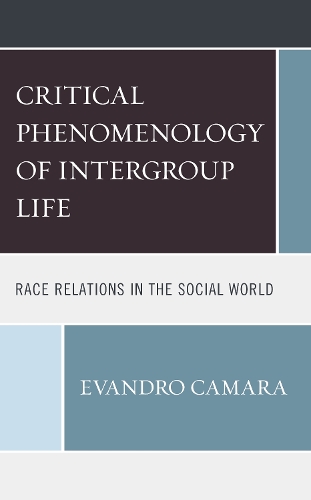
The Critical Phenomenology of Intergroup Life: Race Relations in the Social World
(Hardback)
Publishing Details
The Critical Phenomenology of Intergroup Life: Race Relations in the Social World
By (Author) Evandro Camara
Bloomsbury Publishing PLC
Lexington Books
4th December 2020
United States
Classifications
Professional and Scholarly
Non Fiction
Social theory
305.8001
Physical Properties
Hardback
262
Width 165mm, Height 241mm, Spine 25mm
581g
Description
This book is dedicated to a critical analysis of race relations and inequality through the prism of Schutzian social phenomenology, which focuses on the world of intersubjectivity and the complex of meanings that orient the conduct of individuals and groups. The phenomenological approach provides a more intimate look at how the societal imposition of negative racial meanings on racialized persons crucially determines the construction of the minority subjectivity as essential otherness, thus becoming a pivotal support of race-based inequality.
Reviews
With this book, Professor Camara provides fresh insights into the topical theme of race relations. He uses Schutzs phenomenological social psychology and its focus on meaning to elucidate the construction of self and identity. His subtle analysis reveals how self and identity emerge from the internalization of social meanings assigned to situations, events, and persons. In racially-binary societies such as the U.S., these consist of many racial meanings, definitions, and taxonomies which are taken for granted but prove harmful to the racialized subjectivities. This explains the perpetuation of the otherness of racial minorities in spite of the structural changes and improvements of minority-group life, and reveals the political relevance of the Schutzian approach.
-- Thomas S. Eberle, University of St GallenAfter summarizing the history of U.S. racial relationships and their theoretical investigation, Evandro Camara insightfully explores how systemic racial 'typifications,' la Alfred Schutz, have produced racial essentialism. Hence, long after Jim Crows demise, racialized minorities are still impeded from achieving the social integration possible for white ethnics or Schutzs Stranger or Homecomer. Even multiculturalism and identity politics reflect races absolute structurization of social life, so that racial conflicts perdure and racial minorities remain unassimilable, permanent others and strangers. Racial typifications do not totalize absolutely, though, the free subjectivity of phenomenology. Camaras book, a tour de force, provokes and disturbs.
-- Michael D. Barber, Saint Louis UniversityThe Critical Phenomenology of Intergroup Life fills an essential void in the sociological literature by considering the pervasive sense of strangeness (otherness) experienced by racial minorities in the United States.That race is a social construction, and not a substantive biological characteristic has become a truism in the social sciences over the last twenty years. Adeptly applying insights from the phenomenology of Alfred Schutz, Camara moves beyond race as a social construction to show how systems of racial inequality are not just empirical problems, but also matters of intersubjectivity, issues of a shared and taken for granted social consciousness. This book is filled with insightful historical and theoretical analysis and is vital for anyone interested in race and race relations.
-- Jerry Williams, Stephen F. Austin State UniversityWhy is racism so persistent How do we deal with it Is it possible to have a racism-free society Evandro Camara deals with these and other questions which are not only fundamental, but also current. Based on the best tradition of social phenomenology, he keenly depicts the ontological structure of the social world as composed of different groups and shows that group relations are usually complicated. Hopefully, understanding how society works will help us find a way to equality.
-- Carlos Belvedere, University of Buenos AiresAuthor Bio
Evandro Camara is professor of sociology at Emporia State University.
